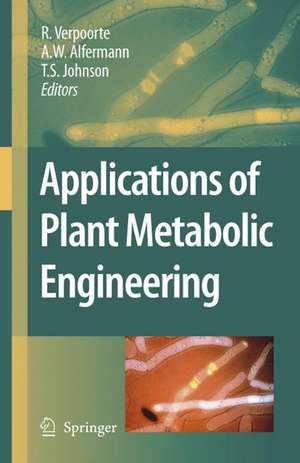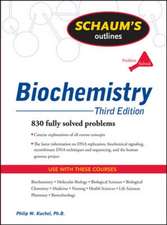Applications of Plant Metabolic Engineering
Editat de R. Verpoorte, A.W. Alfermann, T.S. Johnsonen Limba Engleză Hardback – 6 sep 2007
| Toate formatele și edițiile | Preț | Express |
|---|---|---|
| Paperback (1) | 947.35 lei 6-8 săpt. | |
| SPRINGER NETHERLANDS – 19 oct 2010 | 947.35 lei 6-8 săpt. | |
| Hardback (1) | 955.40 lei 6-8 săpt. | |
| SPRINGER NETHERLANDS – 6 sep 2007 | 955.40 lei 6-8 săpt. |
Preț: 955.40 lei
Preț vechi: 1165.11 lei
-18% Nou
Puncte Express: 1433
Preț estimativ în valută:
182.84€ • 190.18$ • 150.94£
182.84€ • 190.18$ • 150.94£
Carte tipărită la comandă
Livrare economică 14-28 aprilie
Preluare comenzi: 021 569.72.76
Specificații
ISBN-13: 9781402060304
ISBN-10: 1402060300
Pagini: 356
Ilustrații: XXII, 332 p.
Dimensiuni: 155 x 235 x 19 mm
Greutate: 0.73 kg
Ediția:2007
Editura: SPRINGER NETHERLANDS
Colecția Springer
Locul publicării:Dordrecht, Netherlands
ISBN-10: 1402060300
Pagini: 356
Ilustrații: XXII, 332 p.
Dimensiuni: 155 x 235 x 19 mm
Greutate: 0.73 kg
Ediția:2007
Editura: SPRINGER NETHERLANDS
Colecția Springer
Locul publicării:Dordrecht, Netherlands
Public țintă
ResearchCuprins
Biosynthesis of Plant Natural Products and Characterization of Plant Biosynthetic Pathways in Recombinant Microorganisms.- Plant Molecular Farming: Host Systems, Technology and Products.- Plastid Pathways.- Metabolic Engineering of the Alkaloid Biosynthesis in Plants: Functional Genomics Approaches.- Polyamine Biosynthetic Pathway: A Potential Target for Enhancing Alkaloid Production.- Metabolic Engineering in Alkaloid Biosynthesis: Case Studies in Tyrosine- and Putrescine-Derived Alkaloids.- Application of Metabolic Engineering to Vanillin Biosynthetic Pathways in Vanilla Planifolia.- Pathway Engineering of the Plant Vitamin C Metabolic Network.- Metabolic Engineering of Terpenoid Biosynthesis in Plants.- Metabolic Engineering of Seed Oil Biosynthetic Pathways for Human Health.- Metabolic Engineering in Sugarcane: Assisting the Transition to a Bio-based Economy.- Single-chain Fv Antibody Stimulates Biosynthesis of Secondary Metabolites in Plants.- Metabolic Engineering of Sulfur Assimilation in Plants.- Approaches to Quality Plant Based Medicine: Significance of Chemical Profiling.
Recenzii
From the reviews:
"Impressive progress has been made in this rapidly growing area of second generation biotechnology. … is an updated comprehensive reference on the applications of plant metabolic engineering. … This book will prove useful for researchers and professionals alike who are into the field of plant metabolic engineering. It must be emphasized that each chapter in the book is well referenced with current literature, which highlights the task of ending a book in this ever-expanding field … . The authors have done a commendable job." (C. Jayabaskaran, Current Science, Vol. 93 (12), 2007)
"Impressive progress has been made in this rapidly growing area of second generation biotechnology. … is an updated comprehensive reference on the applications of plant metabolic engineering. … This book will prove useful for researchers and professionals alike who are into the field of plant metabolic engineering. It must be emphasized that each chapter in the book is well referenced with current literature, which highlights the task of ending a book in this ever-expanding field … . The authors have done a commendable job." (C. Jayabaskaran, Current Science, Vol. 93 (12), 2007)
Textul de pe ultima copertă
Written by leading international experts in the field of plant metabolic engineering, this book discusses, mainly, applications of plant metabolic engineering. Metabolic engineering, which is part of second generation biotechnology, has made several contributions at basic level as well as at conceptualising products ever since its emergence in the early 1980s. Applications resulting from metabolic engineering are expected to play a very important role in future for plant breeding, e.g. for improved resistance or improved traits concerning health promoting constituents, and production of fine chemicals such as medicines, flavors and fragrances.
Considering the tremendous progress that has been made since our first book in the year 2000 urgency was felt to bring together cutting edge research in plant metabolic engineering in applied aspects as a handy reference book. This book has been predominantly dedicated to applied research of metabolic engineering, and a part of it hasbeen allotted for fundamental research that has potential applications. This book is a unique source of information for all those involved with plants as chemical factories of fine chemicals and also to more experienced scientists who work on transgenic plants, besides, senior researchers, graduate students, post-doctroral students, teachers and students as well.
Considering the tremendous progress that has been made since our first book in the year 2000 urgency was felt to bring together cutting edge research in plant metabolic engineering in applied aspects as a handy reference book. This book has been predominantly dedicated to applied research of metabolic engineering, and a part of it hasbeen allotted for fundamental research that has potential applications. This book is a unique source of information for all those involved with plants as chemical factories of fine chemicals and also to more experienced scientists who work on transgenic plants, besides, senior researchers, graduate students, post-doctroral students, teachers and students as well.










